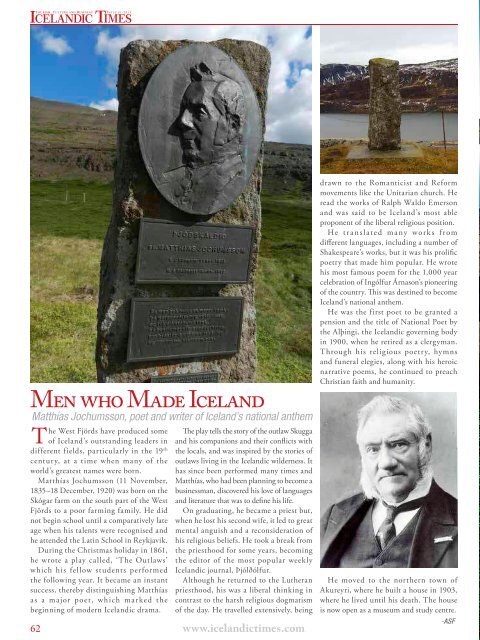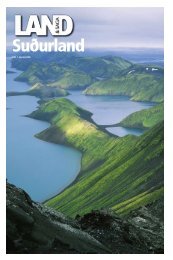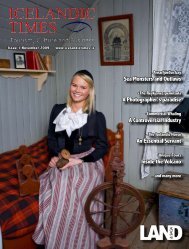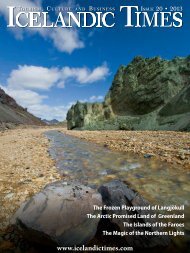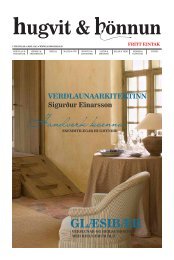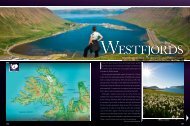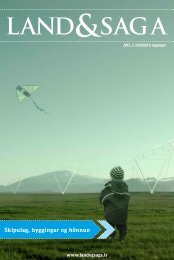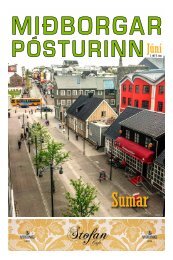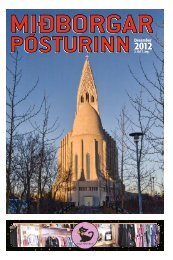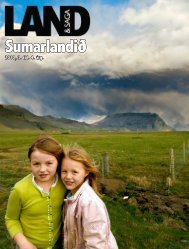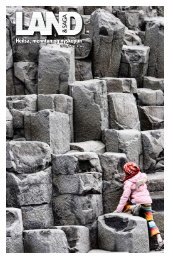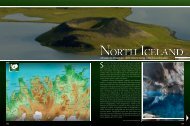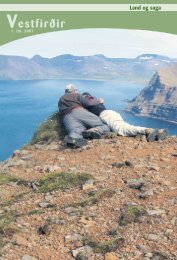Why Birds Flock to Iceland The North Prepares for ... - Land og saga
Why Birds Flock to Iceland The North Prepares for ... - Land og saga
Why Birds Flock to Iceland The North Prepares for ... - Land og saga
- No tags were found...
Create successful ePaper yourself
Turn your PDF publications into a flip-book with our unique Google optimized e-Paper software.
Men who Made <strong>Iceland</strong>Matthías Jochumsson, poet and writer of <strong>Iceland</strong>’s national anthem<strong>The</strong> West Fjörds have produced someof <strong>Iceland</strong>’s outstanding leaders indifferent fields, particularly in the 19 thcentury, at a time when many of theworld’s greatest names were born.Matthías Jochumsson (11 November,1835–18 December, 1920) was born on theSkógar farm on the south part of the WestFjörds <strong>to</strong> a poor farming family. He didnot begin school until a comparatively lateage when his talents were rec<strong>og</strong>nised andhe attended the Latin School in Reykjavik.During the Christmas holiday in 1861,he wrote a play called, ‘<strong>The</strong> Outlaws’which his fellow students per<strong>for</strong>medthe following year. It became an instantsuccess, thereby distinguishing Matthíasas a major poet, which marked thebeginning of modern <strong>Iceland</strong>ic drama.<strong>The</strong> play tells the s<strong>to</strong>ry of the outlaw Skuggaand his companions and their conflicts withthe locals, and was inspired by the s<strong>to</strong>ries ofoutlaws living in the <strong>Iceland</strong>ic wilderness. Ithas since been per<strong>for</strong>med many times andMatthías, who had been planning <strong>to</strong> become abusinessman, discovered his love of languagesand literature that was <strong>to</strong> define his life.On graduating, he became a priest but,when he lost his second wife, it led <strong>to</strong> greatmental anguish and a reconsideration ofhis religious beliefs. He <strong>to</strong>ok a break fromthe priesthood <strong>for</strong> some years, becomingthe edi<strong>to</strong>r of the most popular weekly<strong>Iceland</strong>ic journal, Þjólðólfur.Although he returned <strong>to</strong> the Lutheranpriesthood, his was a liberal thinking incontrast <strong>to</strong> the harsh religious d<strong>og</strong>matismof the day. He travelled extensively, being62 www.icelandictimes.comdrawn <strong>to</strong> the Romanticist and Re<strong>for</strong>mmovements like the Unitarian church. Heread the works of Ralph Waldo Emersonand was said <strong>to</strong> be <strong>Iceland</strong>’s most ableproponent of the liberal religious position.He translated many works fromdifferent languages, including a number ofShakespeare’s works, but it was his prolificpoetry that made him popular. He wrotehis most famous poem <strong>for</strong> the 1,000 yearcelebration of Ingólfur Árnason’s pioneeringof the country. This was destined <strong>to</strong> become<strong>Iceland</strong>’s national anthem.He was the first poet <strong>to</strong> be granted apension and the title of National Poet bythe Alþingi, the <strong>Iceland</strong>ic governing bodyin 1900, when he retired as a clergyman.Through his religious poetry, hymnsand funeral elegies, along with his heroicnarrative poems, he continued <strong>to</strong> preachChristian faith and humanity.He moved <strong>to</strong> the northern <strong>to</strong>wn ofAkureyri, where he built a house in 1903,where he lived until his death. <strong>The</strong> houseis now open as a museum and study centre.–asfTour Opera<strong>to</strong>rAuthorised by<strong>Iceland</strong>ic Tourist Board


